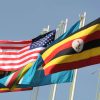Columnists
Youth should carry on with vision of unified Africa
The dream of Africa’s founding fathers of modern statehood was a unified Africa.
Recently, more so Africa’s unity.
The dream of Africa’s founding fathers of modern statehood was a unified Africa.
In his book, Africa Must Unite, Ghana’s founding statesman Kwameh Nkrumah would exhort the African leaders and people to “seek first the political kingdom and the rest shall follow”. Nkrumah was the poster boy of African unity,rallying fellow nationalists to have a United States of Africa. In effect he led a spirited campaign to unyoke the remaining countries that were still shackled by colonialism arguing that Ghana’s independence would be “meaningless if the rest of Africa didn’t get political independence”. He championed political independence as a vehicle for a single unified African continent with one government, military command, one African currency, etc.
This, Nkrumah believed was possible given that Africa wasendowed with enormous resources such as minerals and huge agricultural potential to accelerate her people towards meaningful development.
He belonged to the club of radicalists who wanted a united Africa as a matter of urgency. There was the club of moderates who instead advocated a gradual approach to Africa’s unity; arguing that much of Africa wasn’t yet on a uniform lane of integration. This group, commonly known as the Monrovia Group, carried the day’s contest and would later on lead to a loose association of independent states under the umbrella ofOrganisation of African Unity (OAU) in 1963whose founding statesmen were among others; Milton Obote of Uganda, Emperor Haile Selassie of Ethiopia,Jomo Kenyatta of Kenya, Julius Nyerere of Tanzania, Kwameh Nkrumah of Ghana, Patrice Lumumba of Congo, etc.
The vision of Africa’s unity started collapsing under the heightened cold war politicswhere the Western capitals were sponsoring agents to overthrow leaders who subscribed to socialism ideology such as Nkrumah who was deposed in 1966. Patrice Lumumba was overthrown by Joseph Kasavubuand later on allegedly killed by thenArmy commander Joseph Mobutu (he would later on rename himself IgbenduMobutu Seseseku Kuku Wazabanga) on the instigation of CIA. In Uganda, Milton Obote was overthrown by Idi Amin, and Emperor Selassie of Ethiopia was overthrown byMengistu Haile Mariam.
Towards the end of the cold war in 1991, much of Africa was in the hands of agents of imperialism who would only help to advance the interests of the West. The continent started experiencing revolutions and counter-revolutions ushering in the so-called revolutionaries who were for all intents and purposes a manifestation of imperialism and neo-liberalism. It has never been in the interest of the West to have a unified Africa free to determine its destiny and exploit her resources for the advancement of her people. Today we hear the common tagline of the West’s description of Africa as “the New Rising Giant” which in effect is a mockery of the African continent and meant to assuage the egos of African leaders as the West continuesto plunder the continent’s resources.
President Museveni ischampioning integration at regional level,for our case working around the clock torealise the East African Federation. This is a good initiative on the part of our President and his regional counterparts. The regional economic blocks should now move faster to have political federations which should later on merge into a unified State of Africa.
The youth of Africa, who form the majority of Africa’s population of nearly one billion people, should now spearhead the debate of Africa’s unity and work closelyunder their respective networks to enliven the dream of our founding fathers. The young people need to seriously think of a common African identity includingthe future of Africa they want and how to work towards that envisioned Africa.
It’s only the youth who will enforce change in their respective countries by championing clearleadership devoid of personality cults, corruption, power thirst, institutional breakdown, human rights abuses, poor infrastructure,poverty, etc, which have long held back the dream of African unity. Responsible and selfless leadership is the cornerstone for Africa’s unity.
Above all, unity starts by collectively harnessing our resources including our peopleto develop Africa. Africa’s resources belong to Africa but not the West or China.
bwengo@gmail.com
Comments













